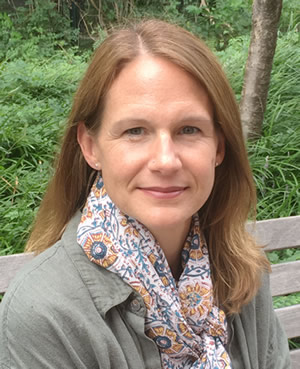By Olivia S. Rissland
 Since her first year of graduate school, mRNA alternative splicing has captured Professor Kristen W. Lynch’s imagination. Although gene regulation had always interested her, there was something special about alternative splicing. When she was a first year graduate student, the process had only been uncovered a few years earlier; Prof. Lynch was excited about how much that was yet to be uncovered about the proteins and mechanisms. “I felt that splicing was the new frontier in gene regulation,” Professor Lynch said, “and I was excited by the sense of a wide-open field with so much to be discovered.”
Since her first year of graduate school, mRNA alternative splicing has captured Professor Kristen W. Lynch’s imagination. Although gene regulation had always interested her, there was something special about alternative splicing. When she was a first year graduate student, the process had only been uncovered a few years earlier; Prof. Lynch was excited about how much that was yet to be uncovered about the proteins and mechanisms. “I felt that splicing was the new frontier in gene regulation,” Professor Lynch said, “and I was excited by the sense of a wide-open field with so much to be discovered.”
Her excitement paid off, and her graduate work (in the lab of Professor Tom Maniatis at Harvard University) shaped much of how we view splicing regulation—and launched a life-long pursuit of deciphering the mechanisms of alternative splicing. As a Post-doctoral Fellow in the lab of Professor Arthur Weiss at UCSF she integrated her understanding of pre-mRNA splicing with the cellular immune response in work focusing on the cell determinant CD45—research that she continued to pursue as an independent investigator. She emphasized that in addition to fostering her love of splicing, her mentors also instilled the importance of “doing rigorous science, of always thinking about the next step, and of communicating one’s work in a simple, clear, and straightforward manner.”
Professor Lynch began her independent career in 2001 as a faculty member at the University of Texas Southwestern Medical Center. In 2009, she moved to the Perelman School of Medicine at the University of Pennsylvania and is currently Chair of the Department of Biochemistry and Biophysics. Although Professor Lynch’s lab continues to work on alternative splicing, research projects are expanding into new areas, including cancer, T cell biology, virology and epigenetics. “Although the mechanisms of splicing regulation will always be my first love,” she said, “I am excited about stretching our research in new directions, and I am enjoying the challenge of learning new sub-fields, studying the functional impact of splicing regulation, and thinking about the interplay of splicing with other regulatory mechanisms.”
“Don’t be frightened by your insecurities… Success comes from being too stubborn to give in to your doubts.”
As department chair, Professor Lynch now has to juggle additional administrative responsibilities on top of research and teaching duties, while also balancing family and personal commitments. She has found that “two things help me succeed: encouragement from colleagues and friends. They have a better sense of my abilities and strengths, and I have been (and still am) motivated and supported by the belief that others have in me. I also find confidence in knowing that I have overcome similar challenges before.” Her advice for junior scientists who might sometimes feel overwhelmed: “Don’t be frightened by your insecurities. We all have them. Success comes from being too stubborn to give in to your doubts.”
Professor Lynch has been an RNA Society member for over 20 years (including serving as Director in 2013/2014), and continues to draw inspiration from the RNA community, which she says has always supported, challenged, and taught her. When asked about her favorite RNA Society memories, she remembered the many career firsts she experienced at RNA Society meetings held at the University of Wisconsin–Madison. “I gave my first ever talk there, I wrote part of my PhD thesis on the lawn above the Union, and my first meeting as a PI was there.” She added, “I sent off my first grant from the Madison Fedex en route to the meeting—and still stayed up until 4 am that first night catching up with friends!” She concluded by sharing that “I have both gotten and given much career and life advice with my RNA friends while sitting on the stairs outside the Union theater—plus the beer is great!”
Although she’s partial to the U1 snRNA, Professor Lynch’s favorite RNA is the human CD45 pre-mRNA, which formed the basis of her post-doctoral work and the first decade of her independent career. Professor Lynch isn’t on social media so the easiest way to find her is at RNA2019 in Krakow!
